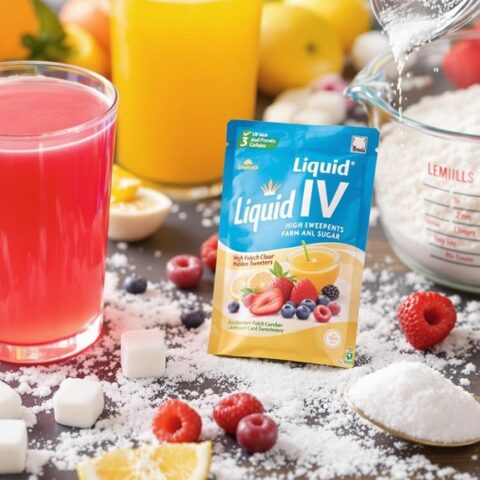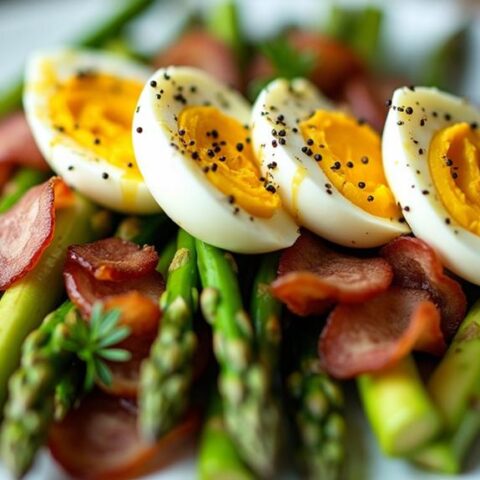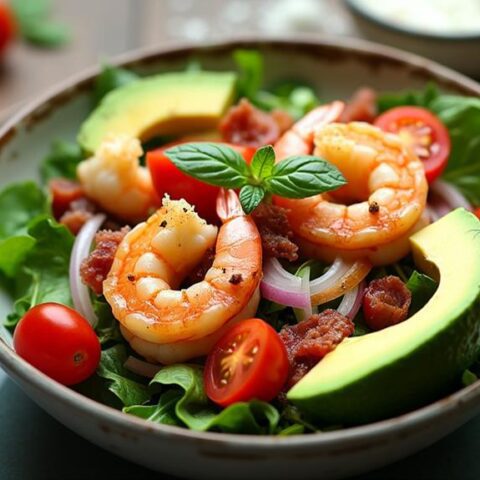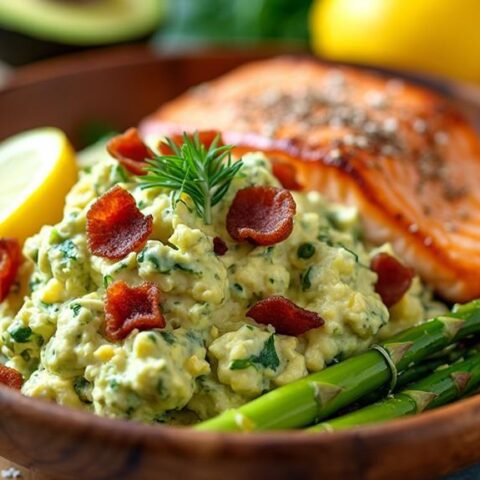To maintain ketosis on a keto diet, avoid refined carbohydrates such as white bread, pasta, and rice due to their high carbohydrate content. Alcoholic drinks like beer and sugary mixed drinks can disrupt ketosis with their significant carb content. Sugary foods, including honey, syrups, and sodas, also pose a risk by raising blood sugar levels. Starchy vegetables like potatoes and corn contain high amounts of carbs and should be replaced with non-starchy alternatives like leafy greens. Ultimately, high-carb snacks such as potato chips, granola bars, and even popcorn can quickly exceed your daily carb limit. Explore further for more practical substitutes and detailed insights.
Key Takeaways
- Avoid refined carbs like white bread, pasta, and rice due to high carbohydrate content.
- Limit sugary foods, including honey, syrups, and sugary sodas, which disrupt ketosis.
- Steer clear of high-carb alcoholic drinks like beer; opt for keto-friendly options in moderation.
- Skip starchy vegetables such as potatoes and corn to maintain ketosis.
- Refrain from consuming high-carb snacks like potato chips, trail mix, and granola bars.
Refined Carbs
Refined carbs, a category that includes white bread, pasta, and rice, are particularly detrimental to the efficacy of a ketogenic diet. These foods are high in carbohydrates, with a single serving of white bread containing approximately 13 grams of carbs and a typical serving of pasta providing around 33 grams.
Such quantities can quickly exceed the daily limit of 20-50 grams required to maintain ketosis, making them unsuitable for a low-carb lifestyle. The rapid digestion of refined carbs leads to swift spikes in blood sugar levels, thereby disrupting the state of ketosis that the ketogenic diet aims to sustain.
This is compounded by the presence of refined sugars, which can further interfere with metabolic processes designed to keep the body in a fat-burning state. To adhere to keto guidelines, carb counting becomes essential.
Monitoring and limiting refined carbohydrate consumption is vital, as even small amounts can greatly impact overall carb intake and dietary goals. Low-carb substitutes like cauliflower rice, zucchini noodles, and low-carb breads are recommended alternatives.
These options help maintain carb levels within the strict parameters of a ketogenic diet, thereby supporting sustained ketosis and its associated metabolic benefits.
Alcoholic Drinks
Maneuvering the landscape of alcoholic beverages while adhering to a ketogenic diet requires meticulous attention to carbohydrate content.
Beer, for instance, typically contains around 13-20 grams of carbohydrates per standard serving, making it a high-carb option to avoid. However, low carb beers are available, offering a more keto-friendly alternative, though their consumption should still be moderated.
Mixed drinks often pose significant challenges due to added sugars, which can exponentially increase their carbohydrate content. Consequently, traditional mixed drinks should generally be avoided. Instead, keto cocktails can be crafted using hard liquors like vodka, whiskey, and tequila, which are inherently low in carbohydrates. These should be paired with unsweetened mixers like soda water or consumed neat.
Dry wines, including red, rosé, and white varieties, provide a more favorable option, as they typically contain about 3-4 grams of carbohydrates per 5-ounce serving. This makes them a relatively better choice for maintaining ketosis.
Hard seltzers have emerged as another viable option, offering approximately 2 grams of carbohydrates per can. Their low carb profile makes them an excellent alternative for those adhering to a ketogenic lifestyle while wishing to indulge responsibly in alcoholic beverages.
Sugary Foods
In the context of a ketogenic diet, sugary foods represent a significant obstacle due to their high carbohydrate content, which can readily disrupt ketosis. Sugary foods, including honey and syrups, are particularly problematic. For instance, honey contains approximately 17 grams of carbs per tablespoon, and maple syrup contains around 13 grams per tablespoon, making them unsuitable for a keto diet.
Sugary sodas are another major concern; a 12-ounce can of Coca-Cola contains about 39 grams of carbs, which can quickly knock someone out of ketosis.
Condiments often contain hidden sugars that add up. Ketchup and barbecue sauce can have between 3 to 15 grams of carbs per serving, largely due to added sugars. Such seemingly small quantities can cumulatively affect carbohydrate intake.
Dried fruits, like Medjool dates with approximately 18 grams of carbs each, are also high in sugars and can hinder ketosis if consumed excessively. Sweetened dairy products, such as flavored yogurts, contribute unnecessary carbs, with many containing significant sugar levels that detract from the low-carb goals of the ketogenic diet.
For those on a keto diet, opting for sugar substitutes and carefully reading labels to avoid hidden sugars is essential to maintain ketosis.
Starchy Vegetables
When adhering to a ketogenic diet, it is essential to be mindful of starchy vegetables due to their high carbohydrate content, which can easily interrupt ketosis. Vegetables such as potatoes, corn, and peas are significant sources of carbs; for instance, a medium potato contains over 30 grams, far exceeding the daily carb allowance for keto dieters. Similarly, sweet potatoes and butternut squash, though nutritious, are too starchy to fit into a low-carb regimen.
The following table highlights the carbohydrate content of common starchy vegetables versus keto-friendly alternatives:
| Starchy Vegetables | Carbohydrate Content (grams) |
|---|---|
| Medium Potato | 30+ |
| Corn (1 cup) | 27 |
| Peas (1 cup) | 12 |
| Sweet Potato (1 cup) | 27 |
| Butternut Squash (1 cup) | 16 |
Instead of these carb-heavy options, focus on starchy vegetable alternatives like spaghetti squash, which contains only about 3.9 grams of net carbs per half cup. Non-starchy, low carb options such as leafy greens, broccoli, and zucchini are excellent choices that support nutrient intake without jeopardizing ketosis. By choosing these alternatives, one can maintain the benefits of a ketogenic diet while still enjoying a variety of flavorful, nutrient-dense vegetables.
High-Carb Snacks
While starchy vegetables pose a considerable challenge to maintaining ketosis, high-carb snacks can be equally disruptive. Potato chips, for instance, contain approximately 14 grams of net carbs per ounce. This high carbohydrate content can swiftly derail ketosis, making them an unsuitable option for those adhering to a ketogenic diet.
Similarly, trail mix, often perceived as a healthy snack, can exceed 12 grams of carbs per ounce. This is primarily due to the inclusion of dried fruits and sweeteners, which are high in sugar and carbohydrates.
Granola bars, another common snack, are often marketed as healthy but can contain as much as 20 grams of carbs per bar. This high carb content makes them incompatible with the low-carb requirements of the keto diet.
Popcorn, though seemingly innocuous, contains around 6 grams of net carbs per cup. This can add up quickly, especially if portion sizes are not meticulously controlled.
Frequently Asked Questions
What Carbs Don T Count on Keto?
On a keto diet, carbohydrates from high-fiber foods, such as leafy greens and avocados, as well as certain sugar alcohols like erythritol and xylitol, do not notably count toward net carbs due to minimal impact on fiber intake.
What Is the Minimum Carbs to Avoid Ketosis?
To avoid exiting ketosis, individuals should maintain net carbohydrate intake below 20-50 grams per day. This range guarantees staying within ketosis thresholds, though some may practice carb cycling to periodically increase intake without fully exiting ketosis.
What Is the Number One Carb to Avoid?
The number one carb to avoid is sugar due to its rapid impact on blood glucose levels, disrupting ketosis. Be cautious of sugar alternatives and hidden carbs in processed foods, which can also hinder ketogenic efforts.
What Foods Are off Limits in a Keto Diet?
On a keto diet, foods with high refined carbohydrates, starchy vegetables, sugary items, and processed snacks should be avoided. Opt for keto-friendly alternatives and be cautious of hidden sugars in flavored dairy products and beverages.
Conclusion
To summarize, adhering to a ketogenic diet necessitates the avoidance of certain high-carbohydrate foods to maintain ideal ketosis. Refined carbs, alcoholic drinks, sugary foods, starchy vegetables, and high-carb snacks contribute greatly to increased blood glucose levels, which impede the metabolic state required for ketosis. By meticulously eliminating these carbohydrate sources, individuals can achieve more effective weight management and improved metabolic health, aligning with the primary objectives of the ketogenic dietary regimen.










No Comments